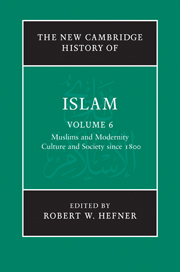Book contents
- Frontmatter
- 1 Introduction: Muslims and modernity: culture and society in an age of contest and plurality
- PART I SOCIAL TRANSFORMATIONS
- 2 New networks and new knowledge: migrations, communications and the refiguration of the Muslim community in the nineteenth and early twentieth centuries
- 3 Population, urbanisation and the dialectics of globalisation
- 4 The origins and early development of Islamic reform
- 5 Reform and modernism in the middle twentieth century
- 6 Islamic resurgence and its aftermath
- 7 The new transnationalism: globalising Islamic movements
- 8 Muslims in the West: Europe
- 9 Muslims in the West: North America
- 10 New frontiers and conversion
- PART II RELIGION AND LAW
- PART III POLITICAL AND ECONOMIC THOUGHT
- PART IV CULTURES, ARTS AND LEARNING
- Glossary
- Bibliography
- Index
- References
4 - The origins and early development of Islamic reform
from PART I - SOCIAL TRANSFORMATIONS
Published online by Cambridge University Press: 28 March 2011
- Frontmatter
- 1 Introduction: Muslims and modernity: culture and society in an age of contest and plurality
- PART I SOCIAL TRANSFORMATIONS
- 2 New networks and new knowledge: migrations, communications and the refiguration of the Muslim community in the nineteenth and early twentieth centuries
- 3 Population, urbanisation and the dialectics of globalisation
- 4 The origins and early development of Islamic reform
- 5 Reform and modernism in the middle twentieth century
- 6 Islamic resurgence and its aftermath
- 7 The new transnationalism: globalising Islamic movements
- 8 Muslims in the West: Europe
- 9 Muslims in the West: North America
- 10 New frontiers and conversion
- PART II RELIGION AND LAW
- PART III POLITICAL AND ECONOMIC THOUGHT
- PART IV CULTURES, ARTS AND LEARNING
- Glossary
- Bibliography
- Index
- References
Summary
Introduction
Early modern Islamic reform can be classified under two general rubrics: the first encompasses the eighteenth-century reform activities that preceded the cultural impact of Europe. The second includes a spectrum of nineteenth-century reforms that were articulated in response to this impact. Naturally, there can be no single date that marks the end of the eighteenth century and the beginning of the modern period, as European penetration and domination took hold at different dates in different places. Moreover, since the extent and significance of the encounter with Europe was not simultaneously appreciated in all parts of the Muslim world, the cultural eighteenth century sometimes lingered past the colonial takeover.
Traditional scholarship asserts that the eighteenth century is a century of political and economic decline and of intellectual stagnation, and that an era of political and intellectual revival and reform ensues in the nineteenth century primarily as a result of the growth of European influence in, and the resulting intellectual challenges to, the Muslim world. The reaction or response to Europe became the central criterion for defining Islamic reform. This approach has privileged one particular kind of intellectual activity, namely that which responded to the ‘European challenge’ by adapting itself to it. While the idea of economic and political decline has been largely discredited in a substantial number of studies, especially by historians of the Ottoman Empire and the Ottoman provinces, the present chapter will focus on the less-studied realm of culture.
- Type
- Chapter
- Information
- The New Cambridge History of Islam , pp. 107 - 147Publisher: Cambridge University PressPrint publication year: 2010
References
- 1
- Cited by



